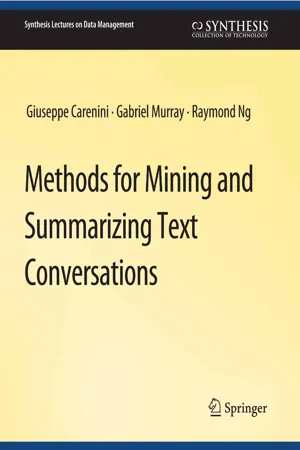
eBook - PDF
Methods for Mining and Summarizing Text Conversations
- English
- PDF
- Available on iOS & Android
eBook - PDF
Methods for Mining and Summarizing Text Conversations
About this book
Due to the Internet Revolution, human conversational data -- in written forms -- are accumulating at a phenomenal rate. At the same time, improvements in speech technology enable many spoken conversations to be transcribed. Individuals and organizations engage in email exchanges, face-to-face meetings, blogging, texting and other social media activities. The advances in natural language processing provide ample opportunities for these "informal documents" to be analyzed and mined, thus creating numerous new and valuable applications. This book presents a set of computational methods to extract information from conversational data, and to provide natural language summaries of the data. The book begins with an overview of basic concepts, such as the differences between extractive and abstractive summaries, and metrics for evaluating the effectiveness of summarization and various extraction tasks. It also describes some of the benchmark corpora used in the literature. The book introducesextraction and mining methods for performing subjectivity and sentiment detection, topic segmentation and modeling, and the extraction of conversational structure. It also describes frameworks for conducting dialogue act recognition, decision and action item detection, and extraction of thread structure. There is a specific focus on performing all these tasks on conversational data, such as meeting transcripts (which exemplify synchronous conversations) and emails (which exemplify asynchronous conversations). Very recent approaches to deal with blogs, discussion forums and microblogs (e.g., Twitter) are also discussed. The second half of this book focuses on natural language summarization of conversational data. It gives an overview of several extractive and abstractive summarizers developed for emails, meetings, blogs and forums. It also describes attempts for building multi-modal summarizers. Last but not least, the book concludes with thoughts on topics for further development. Table of Contents: Introduction / Background: Corpora and Evaluation Methods / Mining Text Conversations / Summarizing Text Conversations / Conclusions / Final Thoughts
Tools to learn more effectively

Saving Books

Keyword Search

Annotating Text

Listen to it instead
Information
Table of contents
- Cover
- Copyright Page
- Title Page
- Contents
- Introduction
- Background: Corpora and Evaluation Methods
- Mining Text Conversations
- Summarizing Text Conversations
- Conclusions / Final Thoughts
- Bibliography
- Authors' Biographies
Frequently asked questions
Yes, you can cancel anytime from the Subscription tab in your account settings on the Perlego website. Your subscription will stay active until the end of your current billing period. Learn how to cancel your subscription
No, books cannot be downloaded as external files, such as PDFs, for use outside of Perlego. However, you can download books within the Perlego app for offline reading on mobile or tablet. Learn how to download books offline
Perlego offers two plans: Essential and Complete
- Essential is ideal for learners and professionals who enjoy exploring a wide range of subjects. Access the Essential Library with 800,000+ trusted titles and best-sellers across business, personal growth, and the humanities. Includes unlimited reading time and Standard Read Aloud voice.
- Complete: Perfect for advanced learners and researchers needing full, unrestricted access. Unlock 1.4M+ books across hundreds of subjects, including academic and specialized titles. The Complete Plan also includes advanced features like Premium Read Aloud and Research Assistant.
We are an online textbook subscription service, where you can get access to an entire online library for less than the price of a single book per month. With over 1 million books across 990+ topics, we’ve got you covered! Learn about our mission
Look out for the read-aloud symbol on your next book to see if you can listen to it. The read-aloud tool reads text aloud for you, highlighting the text as it is being read. You can pause it, speed it up and slow it down. Learn more about Read Aloud
Yes! You can use the Perlego app on both iOS and Android devices to read anytime, anywhere — even offline. Perfect for commutes or when you’re on the go.
Please note we cannot support devices running on iOS 13 and Android 7 or earlier. Learn more about using the app
Please note we cannot support devices running on iOS 13 and Android 7 or earlier. Learn more about using the app
Yes, you can access Methods for Mining and Summarizing Text Conversations by Raymond Ng,Gabriel Murray,Giuseppe Carenini in PDF and/or ePUB format, as well as other popular books in Computer Science & Computer Networking. We have over one million books available in our catalogue for you to explore.